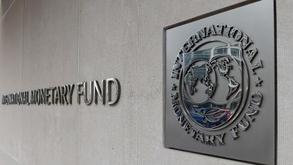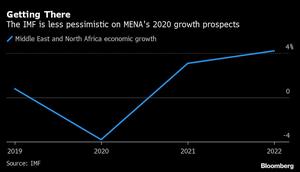 An exterior view of the building of the International Monetary Fund (IMF), with the IMG logo, is seen on March 27, 2020 in Washington, DC. (OLIVIER DOULIERY / AFP)
An exterior view of the building of the International Monetary Fund (IMF), with the IMG logo, is seen on March 27, 2020 in Washington, DC. (OLIVIER DOULIERY / AFP)
Possible delays in distributing vaccines could bring back social unrest in parts of the Middle East and North Africa and obstruct a speedy economic recovery, according to the International Monetary Fund.
Countries in the region with varied vaccine providers and production ability are more prone to favorable economic projections, while those with limited access to vaccines or are in harder-hit areas will have a weaker rally, according to the fund’s regional economic outlook.
Countries in the region with varied vaccine providers and production ability are more prone to favorable economic projections, while those with limited access to vaccines or are in harder-hit areas will have a weaker rally, the International Monetary Fun said
“It’s important to accelerate the provision of the vaccines in order to reduce the risk of diversions between countries, and also diversion within countries, which could lead to some social unrest,” said Jihad Azour, the IMF’s director for MENA and central Asia, in an interview with Bloomberg.
ALSO READ: Aiding the global COVID fight
The IMF moderated its 2020 economic contraction forecast to 3.8 percent from 5 percent in October, driven largely by the stronger-than-projected performance of oil exporting nations, Azour wrote in the regional blog. Gross domestic product for the region this year is seen growing 3.1 percent.
The dual shock of lower crude prices and the spread of COVID-19 hit Middle Eastern countries hard last year. Oil exporters had to contend with lower revenue and lockdown measures by cutting expenditure and tapping bond markets.
Going forward, maintaining a balance between supporting economic recovery and debt sustainability will be “challenging for the region, given that fiscal space is limited,” according to the international lender. Consolidation will need to resume in 2021 for numerous countries, it added.
The IMF also said that recovery in the Middle East is seen lagging behind peers as this year’s GDP is seen as six percentage points lower than in 2019.
READ MORE: Middle East, North Africa take strides in energy
The six countries comprising the Gulf Cooperation Council have the widest vaccination coverage and the most advanced plans and are therefore better positioned for a speedier recovery, the IMF said.

Economic recovery in nations that are heavily impacted by COVID-19’s second wave won’t return to pre-pandemic levels before 2022, it added.
The international lender said stronger fiscal response is seen helping boost recovery this year.
Fiscal balances deteriorated by more than five percentage points of GDP last year in a third of the countries in the region, the IMF added.


